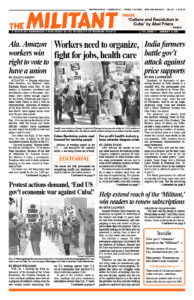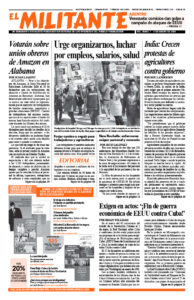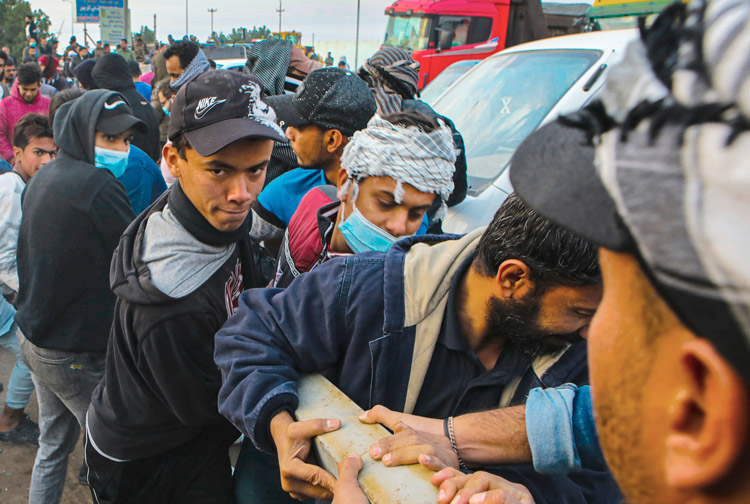Following days of protests across Iraqi Kurdistan by public sector workers demanding back pay, jobs, public services and an end to corruption, thousands more working people took to the streets of Basra and Baghdad to demand a halt to Iraqi government assaults on their livelihoods.
Workers in Basra blocked roads around oil refineries Dec. 20 demanding nine months of unpaid wages. Many are day laborers recently hired after the government promised to create jobs in an area where vast oil resources provide a big part of state revenue. But working people there face large-scale unemployment and worsening conditions.
The capitalist rulers in Baghdad face an economic crisis rooted in the collapse of oil prices and the cost of a bloated government payroll.
The government hopes to prevent a resurgence of the monthslong protests that swept Baghdad and cities across southern Iraq in 2019. Working people joined those actions demanding jobs, an end to rule by the sectarian political parties that dominate the government, and a halt to military interventions and plunder of the country’s resources by Tehran and Washington.
“We are not violent. We just want our rights,” Ammar Sarhan told Rudaw news agency in Basra Dec. 20, vowing to sustain the oil field blockade until the government pays up. Iraqi Prime Minister Mustafa al-Kadhimi visited Basra in August pledging to pay 30,000 unpaid workers. They are still waiting.
A day after the actions in Basra the central bank in Baghdad devalued the Iraqi currency, the dinar, over 20% against the dollar, sending hundreds into the streets to demand the move be reversed. The devaluation exacts further hardship on working people, slashing the value of their wages and threatening damaging inflation in food and other prices. Among demonstrators were many elderly workers, protesting the plunge in the value of their pensions.
Traders at Sulaymaniyah’s market in Iraqi Kurdistan raised food prices rapidly after the devaluation.
Hundreds also marched against the measure in Kut, near the Iranian border, and in other cities.
Roots of the devaluation
Opposition to the devaluation includes the Tehran-backed Asaib Ahl al-Haq militia in Iraq, headed by Qais Khazali, and other pro-Tehran Shiite forces. Militias organized by the Iranian rulers were prominent in Baghdad’s repression of the 2019 anti-government protests, killing at least 700 people. Over the years these militias have led the consolidation of Tehran’s growing influence in the country.
Prime Minister Kadhimi came to office last May after a six-month struggle over who should succeed former Prime Minister Adel Abdul Mahdi, who quit in the face of deepening anti-government protests. Kadhimi has done little to act on his pledge to provide justice for families whose relatives were killed by pro-government forces during those actions.
Iraq’s governing parties are looking for ways to defend the rulers’ profits on the backs of working people. In addition to the devaluation, the government’s draft budget levies an income tax, a 20% sales tax on gasoline and further taxes on small businesses.
The government in Iraq is the country’s largest employer. One reason is that rival political groups use revolving positions in office to put supporters on the payroll to buy loyalty. This was one of the things that helped fuel the 2019 protests. The public sector has tripled in size since Washington’s invasion in 2003, and Baghdad has fallen deeper into debt trying to pay salaries. Now the economic crisis facing the rulers has led them to stop paying.
The Kurdistan Regional Government pays public salaries there, but their budget is based on receiving an annual percentage of the federal budget. Because of Baghdad’s financial crisis and conflicts with the KRG over oil sales, the Iraqi rulers haven’t paid for a long time.
Iraq’s rulers have reached out to the International Monetary Fund seeking aid. But the IMF insists on deeper attacks on working people as a condition, insisting Baghdad prioritize “reversing the unsustainable expansion of wage and pensions bills.”


